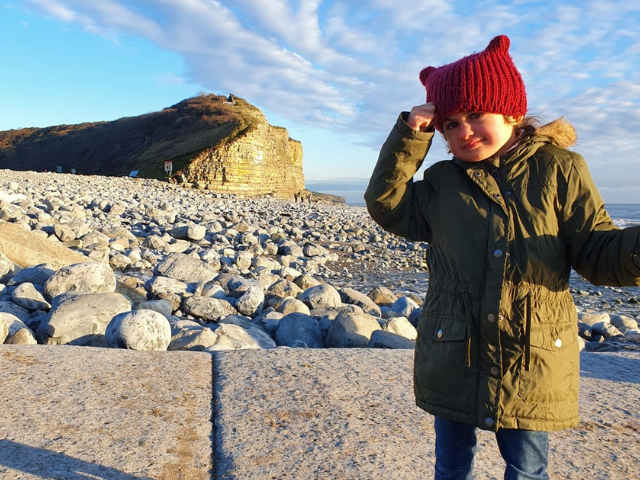
Research gives the gift of Christmas dinner to children and their families
21 December
A mum from Caerphilly county says her young daughter is now able to enjoy the same Christmas dinner as the rest of her family thanks to pioneering research.
9-year-old Saffron has Charge Syndrome* and needs a feeding tube, but the standard commercial milk formula made her extremely ill.
“It’s horrible feeding your child something that you believe is making them ill,” said her mum 44-year-old Julia Rowe, from Machen.
“I knew the milk was wrong, the formula was wrong, and I don’t think as a mum you would feed your child something you wouldn’t eat yourself.
“She was continuously fed for 18 hours a day, so she was always hooked up to a machine. She had chronic diarrhoea and sickness, and felt nauseous all the time. She also had issues with things like very thin hair and she didn’t have any fingernails.”
But thanks to research into the use of home blended diets, Saffron is now much healthier and able to lead a more active life.
“We transitioned to the blended diet over a month and almost immediately she was better,” added Julia.
“It was astounding to watch. I wish I’d had more energy to make a video diary of it because it was literally like the lights came on.
“A lot of people think a blended diet is all about avocados and it really isn’t. It’s just blending up a meal so it goes through the feeding tube. That’s where Christmas dinner is nice. You just help yourself to a plate of food for Saffron and then pop it in the blender.
“It’s great because she knows that she’s had what everybody else is having – and at the same time as well.”
The research – part funded by Health and Care Research Wales – was carried out by Sian Thomas, a Consultant Nurse in Child Health at Aneurin Bevan University Health Board.
“We were hearing that more and more families were beginning to use a blended diet, particularly for children with neuro-disabilities, yet despite the increase in use, there was no research available around the benefits or risks this can bring,” said Sian.
“When I was approached by a parent who was already using a blended diet but needed support to continue doing this, I knew that a robust investigation was needed to ensure we could provide clear professional guidance.”
Sian’s research found:
- episodes of vomiting were much lower for children on a blended diet compared to those on a commercial feed
- no increase in complications in tube blockages or infection rates
- improvement in the child’s mood and behaviour, weight gain, and a better toleration of medication which led to a reduction in convulsions and hospital admissions
As a result of the research findings, the British Dietetic Association has now changed its policy on blended diets. It is also supported by Welsh Government and has been adopted by all seven health boards in Wales.
“Most importantly however the work has empowered patients and their families, and improved their quality of life,” added Sian. “They are able to eat the same food, socialise and have support from professionals to make a choice.”
Saffron’s family have seen big changes since changing to a blended diet and they’re grateful for having the support of Sian’s research.
“It means we have more of a chance of a normal, happy family life”, said Julia. “Even though Saffron’s very tiny still, she looks really healthy and she attends school. She’s never off school.
“It’s just a huge relief to have someone on your side when you’re trying to do something different. I do feel so passionately about it so when Sian started doing her research and getting things formalised, and inviting me to come and speak to dietitians, it was really great because I know it’s worked for so many people.
“Before it was really difficult to go out because you had to take all this equipment with you. Now if I go out for the day with Saffron, I just get organised like any other mum does and I blend up her packed lunch and her snacks for the day and put it in a lunch box and off we go.
“So, we’re just so much more mobile and it just means you can go camping and you can go to Barcelona and places without having to take suitcases full of equipment, which is a great freedom.”
Professor Kieran Walshe, Director of Health and Care Research Wales, said:
“Saffron’s story is the reason why we do research. Hearing how Saffron can now enjoy a more active life with her family, share the same meals and go to school, is a joy – and that’s all possible because of research.
“Our aim is always to improve the lives of patients, people and communities in Wales. Through health and care research, we really can make a difference.”
Jeanette Wells, Assistant Director of Research and Development at Aneurin Bevan University Health Board, said:
“Julia and Saffron’s situation was not unique and it is credit to Sian Thomas, Consultant Nurse for listening to families and identifying the need for research into the risks and benefits of a blended diet.
“I can speak for the whole research and development team in the Aneurin Bevan University Health Board when I say ‘we are delighted to have been able to play a part in this life changing project’.
“In order for research to truly benefit patients, it must be effective and it must change policy and practice. This research has done this and we wish Julia and Saffron, and all other children taking advantage of a blended diet, a very happy Christmas.”
*More information about Charge Syndrome is available on the Sense website.